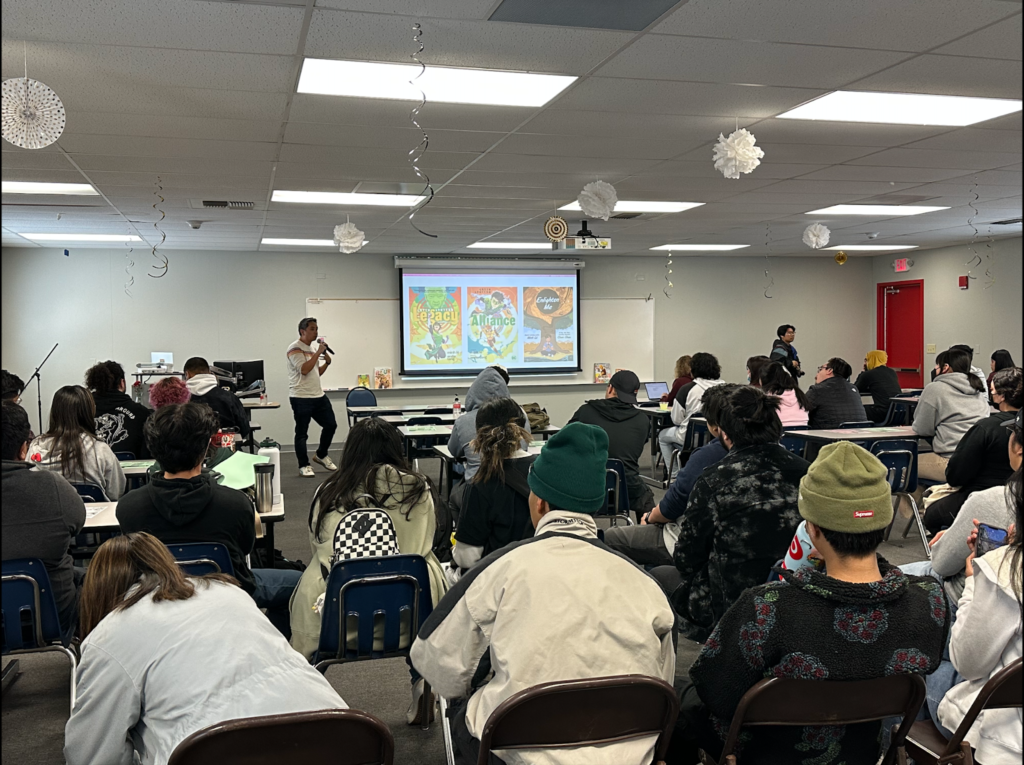Spring 2023: Alex Myers, Alexis Dauz, Sean Malinis
We felt incredibly welcomed at Southwestern College when we went to the school every week. The professor whose class we attended and who organized our involvement on campus is Professor Jojo Ramirez, Assistant Professor in History and Ethnic Studies at Southwestern and an ethnic studies alumni from UC San Diego. We commuted to Southwestern College once a week for six weeks and we spent half of our time in class with students and the other half attending guest lectures and other events on the campus.
The class that we participated in was very diverse. Many students were around the same age as us but there was a broad range of ages: one student was 73 and pursuing college education for herself after putting her children and grandchildren through college. Since we were the same age or younger as most of the students, we did not mentor them as many of our peers working with high school students related to the classrooms they were working in. Instead, we approached the students as our peers and formed new friendships with them. I (Alex) shared some of my creative writing with another student and talked about potentially working on a film with a film student in the future.
Attending guest lectures made us feel welcome in the Southwestern community and we learned a lot. One week four Asian American professors in different fields (ex. Communications, sociology) gave talks about their research for AAPI history month. We learned about ethnic studies theory, art history, and gendered and racialized expectations in healthcare. We were also very lucky to be invited to an event hosted by children’s literature and comic writer Minh Lê who signed copies of his Green Lantern comics for all of us.

From the Green Lantern Legacy Book Talk with Minh Lê, Photo by Jojo Ramirez
The final event that we attended outside of class was a presentation from the bayan scholars on campus and their projects on Filipino students in the school system and how the system can change to better serve the Filipino community. The students had incredibly inventive presentation forms including poster boards, graphic novel strips, and interactive presentations with DnD dice. It was a great opportunity to engage with these students and give them feedback on their incredible and inventive scholarship.

From the Bayan Scholars Symposium, Photo by Phuc To
In the classroom space, students demonstrated how oral history is incredibly important in ethnic studies scholarship. Students conducted oral histories with people in their community and their family members applying concepts that they learned in Professor Ramirez’s Asian American studies class. They then further developed these histories and course concepts through art. Most of the students created tarot cards for their final projects that were based on a concept that connected to the oral histories and the class concepts. The cards were beautiful and a lot of them are going to be published in different academic journals in the near future: one of them is even going to be included in an exhibit in Liberty Station.
We were excited to see this application of oral history in ethnic studies curriculum at the community college, and we engaged with oral histories at our class in UCSD. We practiced oral histories with our peers, interviewing each other about our high school experiences and how race was included or excluded from our curriculum. It was incredibly empowering for us to see ourselves as people who know valuable histories and that we can contextualize our experiences with ethnic studies.

